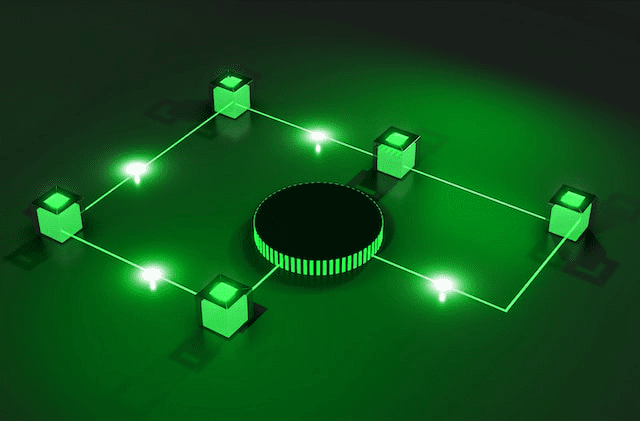The technology of Cryptocurrency is one of the most complicated technologies that has ever been created. And as more investors become involved in the world of Crypto, a larger number of investors become more curious about the Crypto blockchain network—everyone now wants to explore this new world that makes people millionaires, and we’re here to help you out…
While it’s not easy to wrap your head around the blockchain network and its different components, it’s worthwhile to at least learn about a very important component in the system: a node.
Nodes are extremely important in the process of mining Cryptocurrency, and we think that anyone interested in Crypto should know a thing or two about these small, yet vital components. If you’re serious about investing in Crypto, we strongly recommend that you gain an understanding of nodes in the blockchain network, which will help you make wiser decisions when it comes to investing in digital coins.
So, if you are keen about discovering what are nodes, how they work, and what are the different types of nodes, keep reading.
What are Nodes?
The definition of a node in computer science is a small component in a bigger structure, which saves data and is sometimes connected to many other nodes. Nodes are simply basic units that, together, constitute bigger networks. So, Nodes in the world of Crypto are essential components of digital coins that are responsible for the functioning of all types of Crypto, such as BTC, ETH, and DOGE.
How Does Nodes Work?
Nodes maintain Cryptocurrencies by acting as decentralized ledgers. Nodes are responsible for running the software in the blockchain, as well as validating and saving any transaction that occurs on the network. Blockchains record every transaction that has ever taken place on a specific network. It’s a series of transaction blocks that all of the network’s components have decided are valid.
And in case you were wondering, the blockchain is located in the nodes. An identical copy of every transaction is stored by all nodes. They transfer data from one another when new blocks are added on the network. This way, all nodes get to learn about this update. Nodes also verify the dealings of one another on the blockchain and preserve the accurate data of previous transactions.
What are the Different Types of Nodes?
Nodes are not created equal—there are several types of nodes in the network that differ in function, each of which does a different, yet important task on the blockchain. Here are the most important types of nodes that you should know about:
- Master nodes: The infrastructure that supports different digital coins like BTC, DASH, and ETH, includes master nodes. There are no new blocks added by master nodes in the network—they just validate the authenticity of any new block and govern the blockchain. Other nodes differ from master nodes since they add new blocks in the network, but master nodes do not.
- Archival nodes: When people use the word ’full nodes’, they usually mean archival nodes. An archival node is a node that fully validates all of Bitcoin’s rules. Full nodes are essential in the blockchain network since they serve as the basic foundation of the whole network. The whole blockchain is hosted by archival nodes as they act as servers in the system. Maintaining consensus and validating blocks is basically what this type of node does.
- Pruned nodes: just like archival nodes, pruned nodes are a type of full nodes. This type of node works on saving space on the hard disc of its users as it ‘prunes’ unnecessary, old blocks. The whole blockchain has to be downloaded by pruned nodes in order to run. Then, pruned nodes start removing old blocks first, and they keep working until they reach a point where they solely hold new transactions in the network.
- Lightweight nodes/light nodes: the entire blockchain is not downloaded by this type of node—the block headers are the only things that are downloaded by lightweight nodes for the purpose of validating the transactions’ authenticity. As a result, maintaining and running is easy for light nodes. In order to validate transactions, light nodes utilize a mechanism known as Simplified Payment Verification (SPV).
- Mining nodes: during the process of cryptocurrency mining, miners—full or lightweight nodes—seek to demonstrate that they have finished the task necessary to make new blocks, which is referred to as Proof of Work (PoW). To do that, all miners have to receive necessary data held by nodes in order to understand the situation of the network, or become archival nodes.
- Authority nodes: a consensus algorithm for partially decentralized networks, such as Proof of Authority (PoA) and Delegated Proof of Stake (DPoS), are usually the type of algorithm that makes use of authority nodes. Authority nodes offer the same function as full nodes, the main difference is that authority nodes function on partially decentralized networks.
Also Read:- Which Cryptocurrency Will Make You A Millionaire?
Final Thoughts
So now that you know more about nodes in the blockchain network, you can use your knowledge in understanding how the network works and indirectly make profit out of it. You can run your own node by downloading the Bitcoin Core software, allowing it to verify each block. This improves the security of user-conducted transactions, which is crucial if you intend to carry out several transactions in a short period of time. Even better, you will enjoy full autonomy and make sure that you get real Cryptocurrency when you do that!
